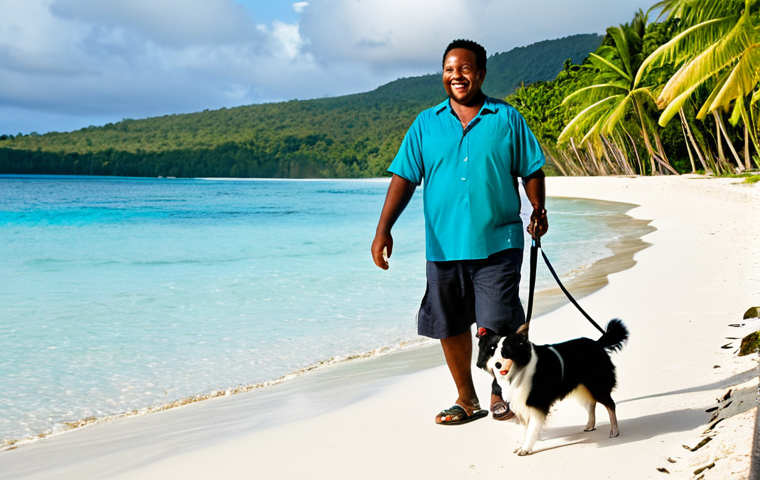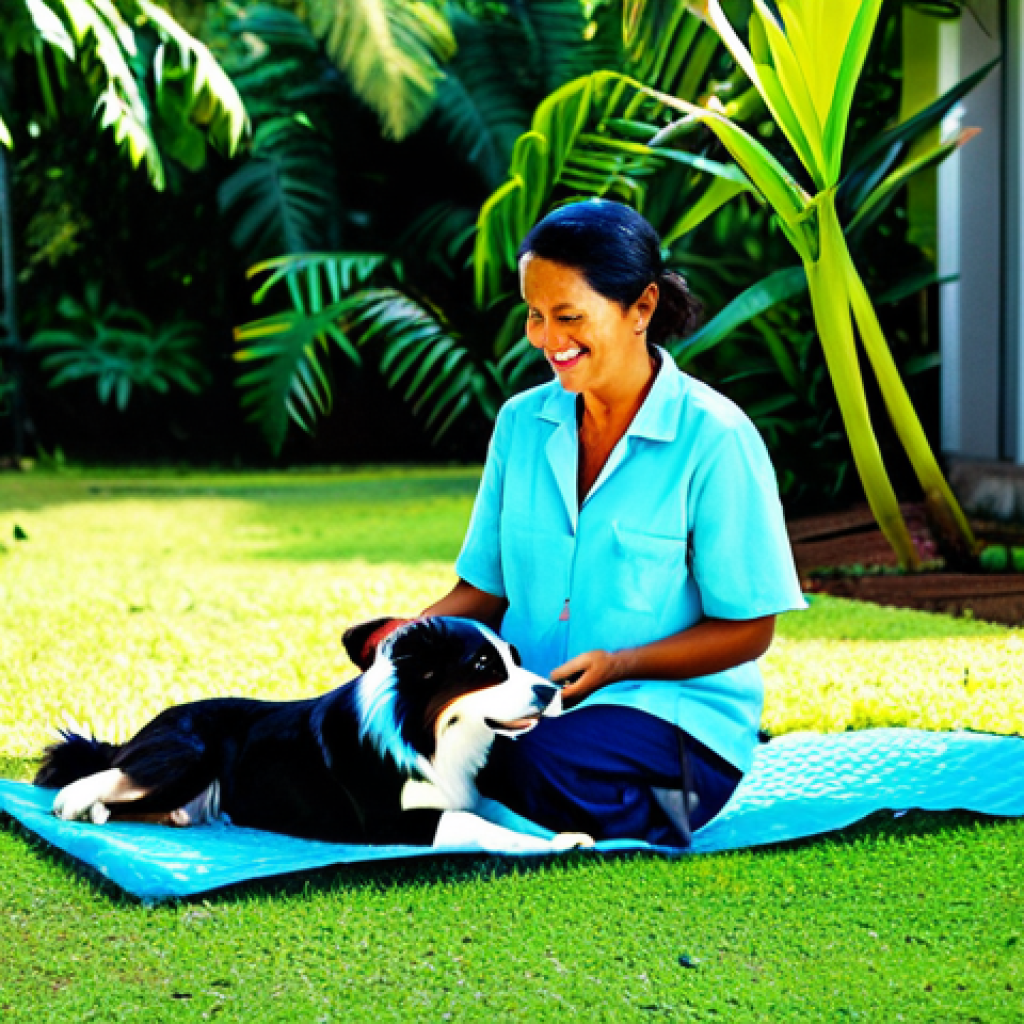The thought of moving to a tropical paradise like Vanuatu often conjures images of pristine beaches and swaying palm trees, right? But for many of us, the dream isn’t complete without our furry, scaled, or feathered companions by our side.
I remember vividly the mix of excitement and trepidation when I first considered bringing my own rescue dog, Kai, to Port Vila. It felt like stepping into an entirely different world, not just for me, but for him too.
The island life, with its unique rhythm and environmental considerations, truly demands a whole new playbook for responsible pet parenting. From my personal journey, I quickly learned that pet care here isn’t just about leisurely beach strolls; it’s about navigating the tropical climate’s impact on their health, understanding local veterinary resources – which are surprisingly dedicated but unique – and adapting to a community where traditional views on animals might differ from what you’re used to back home.
What’s fascinating is seeing how modern pet care trends, from sustainable food options to the rise of tele-veterinary consultations, are slowly but surely making their way even to this serene archipelago, promising a future where support for our beloved animals becomes even more accessible and tailored.
The initial hurdles, the sheer joy of watching Kai embrace island life, and the heartwarming local connections we’ve made truly made it an unforgettable experience.
We’ll delve into the specifics.
Embracing Island Living: Acclimatizing Your Pet to the Tropics

Moving from a temperate climate to the perpetual warmth and humidity of Vanuatu can be a significant adjustment for our pets, especially for those with thick coats or breeds prone to overheating. I remember the very real concern I felt for Kai, my Border Collie mix, who had always loved brisk walks in cooler weather. The tropical sun here is intense, and the humidity can make even moderate temperatures feel stifling. My first few weeks were a constant vigil, ensuring he wasn’t overexerting himself or showing signs of distress. It quickly became clear that his comfort and safety hinged on a radical shift in our daily routine. We moved our walks to the early morning hours, often before the sun had fully risen, or late in the evening when the air finally offered some respite. Finding shaded spots became an art form, whether under a grand banyan tree at the local park or simply a well-placed umbrella on our deck. I also invested in a few cooling mats and wet towels, keeping them on standby for those particularly sweltering afternoons when even the slightest activity seemed too much. It’s not just about comfort; it’s about preventing serious health issues like heatstroke, which can develop surprisingly quickly in these conditions. Watching for subtle cues – excessive panting, lethargy, or a refusal to move – became second nature. It’s a constant dance with the climate, a gentle reminder that their well-being is entirely in our hands when we choose to share this island paradise with them.
Heat and Humidity: Managing Hydration and Overheating Risks
The relentless heat and pervasive humidity in Vanuatu demand proactive measures to keep pets safe and comfortable. I quickly learned that merely providing a water bowl wasn’t enough; it had to be a constant, fresh supply, often replenished multiple times a day as Kai would gulp it down. Dehydration is a very real threat here, not just from lack of water but also from increased respiration and sweating through their paw pads. I even started adding a little electrolyte solution to his water during particularly hot spells, upon vet advice, to help balance his minerals. Beyond hydration, managing overheating is paramount. Recognizing the signs – rapid, shallow panting, bright red gums, drooling, or even a sudden collapse – is critical. I’ve heard stories from other expat pet owners about scary close calls, which only reinforced my vigilance. During the hottest parts of the day, usually between 10 AM and 4 PM, Kai is strictly indoors, enjoying the cooler tiled floors or a fan. Some friends even run their air conditioning for their pets! Simple tricks like a damp towel draped over their back or a kiddie pool filled with shallow water for a quick splash can make a huge difference. For walks, I always carry a collapsible water bowl and a bottle of chilled water, stopping frequently to ensure Kai stays hydrated. It’s a commitment, but seeing him happy and healthy makes every effort worthwhile.
The Unexpected Tropical Fauna: Pests and Parasites
One of the less glamorous realities of living in a tropical paradise like Vanuatu is the abundance of pests and parasites that absolutely thrive in this environment. It’s not just the common fleas and ticks you might be used to; we’re talking about a whole new level of vigilance required for things like heartworm, which is rampant here due to the high mosquito population. My vet explained that every single outdoor dog in Vanuatu should be on monthly heartworm prevention, without exception. Neglecting it is simply not an option. Beyond that, the ticks here are formidable. I vividly recall the first time I found a particularly large, engorged tick on Kai after a seemingly innocent walk through some tall grass. It sent shivers down my spine, knowing the potential for tick-borne diseases. Daily checks are non-negotiable, and I’ve become quite adept at removing them swiftly and safely. We rely heavily on prescription-strength preventative treatments, both oral and topical, recommended by the local veterinarian. There are also specific intestinal parasites that are more prevalent in tropical climates, so regular deworming is also a part of our routine. It’s a constant battle, but with consistent prevention and careful observation, you can keep your beloved companion safe and healthy from these unwelcome residents of paradise. It really brings home the fact that while the scenery is idyllic, the microscopic world has its own set of challenges.
Navigating the Veterinary Landscape: Essential Care in Vanuatu
When you’re far from home, one of the biggest anxieties for any pet parent is knowing what to do if your furry friend falls ill or gets injured. I remember pouring over online forums and asking every expat I met about the veterinary services available in Port Vila. What I discovered was a landscape that, while perhaps not as sprawling as a major metropolitan city, is characterized by dedicated professionals who truly care. The initial thought of limited resources can be daunting, but my experience taught me that the vets here, often trained internationally, are incredibly resourceful and provide a surprisingly comprehensive range of services, adapting to the unique challenges of island life. They handle everything from routine vaccinations and spay/neuter operations to emergency surgeries and diagnostic testing, often with equipment that might not be cutting-edge but is certainly effective. The care is personal, and I’ve found that the vets genuinely remember Kai and ask about him by name. It’s a comforting feeling to know that in a crisis, there are skilled hands and compassionate hearts ready to help. The costs, I’ve found, are generally more affordable than in Western countries, which is a relief, especially when unexpected issues arise. However, it is always wise to have an emergency fund or pet insurance, as specialized treatments or highly advanced diagnostics might require sending samples overseas, incurring additional costs.
Finding Reliable Vets: What to Expect from Local Clinics
Locating a trustworthy veterinary clinic in Vanuatu is a top priority for any new arrival with pets. My approach was simple: ask around! Word-of-mouth among the expat community proved to be invaluable. There are a few key veterinary practices in Port Vila, and each has its own strengths. What you’ll find might differ from the state-of-the-art facilities you’re accustomed to in larger countries. For instance, diagnostic capabilities might be more limited. Blood tests often need to be sent off-island for analysis, which can mean a longer wait for results and sometimes a higher cost. However, the vets themselves are highly experienced, often having worked in various countries, bringing a wealth of knowledge and practical skills. I was genuinely impressed by their ability to diagnose and treat a wide range of conditions with the resources at hand. Emergency care is available, though it might not be a 24/7 dedicated emergency hospital. It’s more likely to be an on-call service from a primary vet, so establishing a relationship with a clinic early on is crucial. I’ve found that communication is key; don’t hesitate to ask questions, no matter how small. They understand that pet parents arriving from different countries have different expectations and are generally very patient in explaining local procedures and available treatments. It’s a testament to their dedication to animal welfare in a developing island nation.
Common Ailments and Preventative Measures: A Tropical Perspective
Living in a tropical climate exposes pets to a different spectrum of common ailments than what you might find elsewhere. Beyond the parasites, skin conditions are incredibly prevalent here, thanks to the constant humidity and warmth. Hot spots, fungal infections, and bacterial dermatitis seem to be almost an annual occurrence for many dogs. Kai, despite my best efforts, developed a stubborn fungal infection between his toes, which required regular medicated foot soaks and oral antifungals. It taught me the importance of drying paws thoroughly after any wet activity and keeping a close eye on any redness or itching. Ear infections are also common, especially for dogs with floppy ears, due to the humidity creating a perfect breeding ground for yeast and bacteria. Regular ear cleaning with a vet-approved solution is a must. And let’s not forget the occasional encounter with something indigestible! Straying cats and dogs, and even curious pets, sometimes pick up things they shouldn’t, leading to gastrointestinal upsets. Prevention is truly the best medicine here: a strict flea/tick/heartworm regimen, vigilant daily checks for skin issues, proper hygiene, and an awareness of what your pet is sniffing or trying to eat on walks. Regular check-ups with your local vet are also essential to catch any issues early before they become serious. They can also advise on local dietary supplements or specific shampoos that help pets thrive in the tropical environment.
| Common Concern | Typical Symptoms | Prevention/Treatment Approach |
|---|---|---|
| Heat Stress/Stroke | Excessive panting, lethargy, vomiting, wobbly gait | Plenty of fresh water, shade, avoid midday sun, cooling mats/baths |
| Tick-borne Diseases | Lethargy, fever, joint pain, loss of appetite, pale gums | Regular tick prevention (spot-ons, collars), daily checks, vet consultation for treatment |
| Mosquito-borne Diseases (e.g., Heartworm) | Cough, fatigue, weight loss, difficulty breathing (advanced) | Monthly heartworm medication, mosquito repellents (pet-safe) |
| Skin Infections (Fungal/Bacterial) | Redness, itching, hair loss, unpleasant odor, scabs | Regular bathing with medicated shampoos (vet-prescribed), drying thoroughly, diet support |
| Gastrointestinal Upset | Vomiting, diarrhea, loss of appetite (often due to diet changes or parasites) | Controlled diet, avoid human food scraps, regular deworming, vet consultation |
Harmonizing with Local Culture: Pet Etiquette and Community Views
One of the most eye-opening aspects of pet ownership in Vanuatu has been understanding and adapting to the local cultural perspectives on animals. It’s vastly different from what I was used to back home. In many Western societies, pets are often seen as cherished family members, sometimes even treated like children. Here, while there is affection and a practical appreciation for animals, especially dogs for security, the concept of a pet being solely an indoor companion or having the same ‘rights’ as a human family member isn’t universally shared. I quickly noticed the large number of free-roaming dogs, often referred to as ‘village dogs,’ which can sometimes be mistaken for strays. However, many of these dogs actually have informal caretakers or belong to a general community. It was a learning curve for me to distinguish between a truly abandoned animal and one that simply has a different living arrangement. This difference in perception also means that some local people might not understand the extensive care, specific diets, or medical attention that many expats provide for their pets. There’s a pragmatic approach to animal welfare, which can sometimes be hard for Westerners to reconcile with their own emotional attachment to pets. However, the Ni-Vanuatu people are incredibly respectful and curious, and I’ve found that explaining my practices for Kai, like his specific dietary needs or why he needs regular tick prevention, has often led to interesting and positive interactions. It’s about finding a balance between respecting local customs and ensuring your pet’s well-being according to your own standards.
Understanding Ni-Vanuatu Perspectives on Animals
My initial perception of animal welfare in Vanuatu was heavily influenced by my upbringing, where pets were always inside, had their own beds, and were meticulously cared for. Here, the landscape is different. You’ll see chickens, pigs, and dogs wandering freely, often integrated into the village or neighborhood fabric. It took me some time to truly grasp that many of these animals, especially dogs, aren’t necessarily neglected but are living a more communal, self-sufficient life. For many Ni-Vanuatu, dogs serve practical purposes—as guards, hunting companions, or simply as part of the household environment, but without the same level of emotional anthropomorphism that’s common in Western cultures. I’ve observed that while direct cruelty is rare, the concept of preventative care, routine vaccinations, or spaying/neutering for companion animals is not as widespread as it should be, primarily due to economic factors and traditional beliefs. This can sometimes lead to a cycle of overpopulation and related health issues. My approach has been one of gentle education and demonstration. When locals see how healthy and happy Kai is, and how his good behavior benefits our neighborhood, it sometimes sparks curiosity. It’s a slow process of cultural exchange, demonstrating responsible pet ownership in action, rather than imposing external standards. It’s about respecting their traditions while subtly advocating for better animal welfare through example and open dialogue, emphasizing the benefits to both animals and the community.
Responsible Pet Ownership in a Community Setting
Living in Vanuatu means becoming part of a close-knit community, and that extends to how your pet interacts with the local environment and its residents. Responsible pet ownership here isn’t just about microchipping or vaccinations; it’s about being a good neighbor and respecting the local way of life. Leash laws, while they exist in some areas, aren’t always strictly enforced, but that doesn’t mean you should let your dog roam freely, especially in populated areas. I always keep Kai on a leash, partly for his safety (to prevent encounters with local dogs or vehicles) and partly to respect those who might be uncomfortable around dogs. Picking up after your dog, while perhaps not a common practice among all residents, is absolutely essential for expats. The last thing you want is for your pet’s waste to become a nuisance or a health hazard, especially near public spaces or the pristine beaches. I’ve even had friendly conversations with local children who, out of curiosity, tried to feed Kai human food, explaining gently why it wasn’t good for him. It’s about being an ambassador for responsible pet care. If your dog barks excessively, be mindful of your neighbors. If they’re prone to chasing chickens (a common sight!), keep them under control. Your actions, and your pet’s behavior, reflect not just on you but on the entire expat community. Being considerate and proactive in managing your pet’s impact on the local environment goes a long way in fostering positive relationships and ensuring a harmonious life for everyone, two-legged and four-legged alike.
Sustainable Pet Ownership: Responsible Choices for Paradise
The beauty of Vanuatu comes with a deep responsibility to protect its fragile ecosystem. This isn’t just about reducing your own carbon footprint; it extends to how we care for our pets. When I first arrived, I found myself facing a real dilemma about sourcing Kai’s food. Importing specialized pet food can be incredibly expensive, and the packaging contributes significantly to waste, which is a major concern on an island with limited waste management facilities. It forced me to think creatively and embrace a more sustainable approach to his diet and care. I started researching local alternatives and was pleasantly surprised by the options available, even if it meant a bit more effort. Fresh, locally sourced protein like fish or chicken, combined with cooked vegetables and rice, became a staple in his diet, supplementing his kibble. Not only did it reduce our reliance on imported goods and excessive packaging, but Kai absolutely thrived on it! His coat became shinier, and his energy levels were fantastic. It wasn’t just about food either; it was about considering the entire lifecycle of our pet products. From choosing biodegradable waste bags to researching eco-friendly toys, every decision felt like a small step towards preserving the stunning environment that we now call home. It’s a humbling experience, realizing that even our pets, inadvertently, can have an impact on this delicate paradise, and that we have a powerful role to play in minimizing that footprint.
Sourcing Pet Food and Supplies Locally: Challenges and Solutions
The quest for quality pet food and supplies in Vanuatu can be an adventure in itself, often presenting a unique set of challenges compared to what you might be used to. Large, well-stocked pet stores with endless aisles of specialized kibble and gourmet treats simply don’t exist in the same way. What you’ll find are smaller shops, some grocery stores, and local markets that offer a more limited selection. Imported premium pet foods are available, but they come with a hefty price tag due to shipping costs and import duties. This led me to explore local sourcing more thoroughly. For Kai, this meant supplementing his diet with fresh fish from the Port Vila markets – often caught that very morning! – and locally grown vegetables like sweet potato, pumpkin, and greens. Always cooked, of course. It’s not just about cost; it’s about freshness and supporting the local economy. For other supplies, like durable leashes or specific training aids, you might have to be a bit more resourceful. I’ve learned to stock up on certain items during trips abroad or rely on online orders that ship internationally, though customs can sometimes be a hurdle. When it comes to everyday consumables like poop bags, I actively seek out biodegradable options available from small local suppliers or bring them in bulk. It’s a constant exercise in adapting and innovating, and it truly makes you appreciate the vast array of choices we often take for granted elsewhere. But the satisfaction of feeding Kai fresh, local ingredients is truly rewarding.
Minimizing Your Pet’s Environmental Pawprint
Living in a place as pristine as Vanuatu quickly highlights the importance of minimizing our environmental impact, and our pets are no exception. One of the biggest considerations is waste. Every plastic pet food bag, every non-biodegradable toy, adds to the island’s waste challenge. I became acutely aware of this when I saw how limited the waste management infrastructure is here. My first step was to significantly reduce reliance on heavily packaged commercial foods by incorporating more fresh, unpackaged local ingredients into Kai’s diet. For his waste, I exclusively use compostable poop bags, and wherever possible, I dispose of his waste in a manner that doesn’t harm the local ecosystem – away from water sources and sensitive areas. Beyond waste, managing your pet’s reproductive impact is critical. Overpopulation of unmanaged animals, particularly dogs, is a significant issue in Vanuatu, leading to welfare problems and sometimes impacting local wildlife. Supporting local spay/neuter initiatives, or ensuring your pet is desexed, is one of the most powerful contributions you can make to sustainable pet ownership here. It’s also about educating others, gently, about the benefits of controlling pet populations. Even simple things, like avoiding harsh chemical flea treatments that could wash into the groundwater, or choosing natural pet shampoos, contribute to a healthier environment for everyone. It’s about being a conscious consumer and a responsible steward of the land, making sure that our beloved companions contribute positively, or at least minimally, to the environmental well-being of this beautiful island.
Keeping Them Safe: Managing Unique Hazards in Vanuatu
While the allure of Vanuatu lies in its natural beauty, this raw, untamed environment also presents unique hazards for our pets that we might not encounter in more urbanized or temperate climates. It’s not just about the heat and humidity, which are constant factors. My early days with Kai involved a steep learning curve about everything from venomous critters to the dangers of the beautiful, yet unpredictable, ocean. I remember a terrifying moment when Kai, ever curious, darted towards what looked like a harmless stick on the beach, only for me to realize it was a sea snake. My heart leaped into my throat. Thankfully, I was able to grab him just in time. This incident, among others, really hammered home the need for hyper-vigilance and a solid understanding of the local flora and fauna. There are plants with toxic sap, insects that deliver painful stings, and marine life that can be dangerous if disturbed. It’s a constant balance between letting your pet explore and keeping them safe from unseen threats. Every walk became an exercise in scanning the ground ahead, identifying potential dangers, and teaching Kai to “leave it” when encountering anything suspicious. This awareness isn’t meant to instill fear, but rather to empower pet owners with the knowledge to mitigate risks and ensure their companions can truly enjoy the wonders of island life without succumbing to its hidden perils. It’s a part of the adventure, albeit a challenging one at times.
Coastal Dangers: Ocean Safety and Marine Life Encounters
For many dogs, the ocean is an irresistible playground, and Kai is no exception. However, the pristine waters of Vanuatu hold their own set of specific dangers. The strong currents in certain areas, especially near reefs or during tidal changes, can be surprisingly powerful and quickly sweep a dog out to sea. I always check the conditions before letting Kai off-leash near the water, and even then, I never let him swim too far out. Beyond the currents, the marine life itself poses threats. As I mentioned, sea snakes, though generally timid, are venomous and best avoided. Jellyfish stings are also a possibility, causing painful welts. And while beautiful, the coral reefs are razor-sharp. A playful run on the reef at low tide can result in deep cuts to paws. I learned this the hard way when Kai came back from a beach run with a small but bleeding gash on his pad. The saltwater itself can also be an issue; too much ingestion can lead to salt poisoning, causing vomiting and diarrhea. Always bring fresh water to the beach to offer your dog frequent sips. And after a swim, a thorough rinse with fresh water is essential to remove salt and sand, which can irritate their skin and ears. Enjoying the beach with your dog is one of the true joys of Vanuatu life, but a healthy respect for the ocean’s power and its inhabitants is absolutely paramount for their safety and your peace of mind.
Protecting Against Unseen Threats: Plants, Insects, and Wildlife
Beyond the beaches, the lush tropical vegetation and diverse insect life of Vanuatu present another layer of potential hazards for our pets. Many common tropical plants, while beautiful, can be toxic if ingested. I vividly remember researching local flora after Kai tried to nibble on a bright red fruit during one of our walks. Learning which plants are definitively off-limits became a priority. Certain ferns, lilies, and even some common garden ornamentals can cause everything from mild gastrointestinal upset to severe organ damage. It’s essential to be vigilant about what your dog is sniffing or attempting to chew on, especially in unfamiliar areas. Then there are the insects. While large, venomous spiders or scorpions aren’t as common a threat as in some other tropical regions, painful ant bites, aggressive bees, and other stinging insects can cause localized reactions or even allergic responses in sensitive pets. And while true snakes are rare, other reptiles might carry parasites or diseases. The key here is prevention through awareness. If you have a garden, research pet-safe plants. If you’re out walking, keep a close eye on your pet and teach them strong “leave it” and “come” commands. Investing in good quality tick and flea prevention is non-negotiable for external parasites. And if you suspect your pet has ingested something toxic or been stung, contact your vet immediately. Being prepared and informed allows you to navigate these potential dangers with confidence, ensuring your adventurous companion remains safe while exploring the wonders of their tropical home.
The Emotional Rewards: Building a Life with Your Pet on the Island
Beyond the logistical challenges and practical considerations of pet ownership in Vanuatu, there’s an incredibly rich tapestry of emotional rewards that make every effort worthwhile. Sharing this unique island experience with Kai, my loyal companion, has deepened our bond in ways I never anticipated. His sheer joy at discovering a new scent on a beach walk or splashing in the shallows of a calm bay is infectious. He reminds me to slow down, to appreciate the simple pleasures, and to truly immerse myself in the present moment. Living in a less structured environment, away from the hustle and bustle of city life, has allowed us to create a rhythm that is profoundly peaceful and connected. Our days often revolve around his needs and our shared adventures, whether it’s an early morning hike up a volcanic path or a relaxed afternoon nap under a mango tree. I’ve seen him transform from a rescue dog with a slightly anxious past into a confident, island-loving canine, completely at home in this paradise. His adaptability, his resilience, and his boundless enthusiasm for new experiences have been a constant source of inspiration for me. It’s a testament to the profound connection we share, a bond forged through shared challenges and countless moments of pure, unadulterated happiness. Having him here isn’t just about having a pet; it’s about having a co-adventurer, a furry confidante, and a constant reminder of the simple joys of life in one of the most beautiful places on earth.
Deepening Your Bond: Shared Adventures and Island Explorations
The vast, natural playground that is Vanuatu offers unparalleled opportunities for shared adventures that can significantly deepen the bond with your pet. Unlike congested city parks, here you can find secluded beaches, winding bush tracks, and open fields perfect for exploration. Kai and I have spent countless hours exploring the stunning coastline, his paws digging into the soft sand as he chased after hermit crabs (never catching them, thankfully!). We’ve ventured inland on gentle hikes, discovering hidden waterfalls and listening to the symphony of the jungle. These shared experiences, away from the distractions of everyday life, create a unique connection. There’s something incredibly primal and satisfying about navigating the natural world with your dog by your side, relying on each other. I’ve watched Kai’s confidence grow with every new scent he sniffs, every new path he discovers. And through his eyes, I often see things I might otherwise miss – the darting geckos, the rustling leaves of a coconut tree, the subtle changes in the tide. These aren’t just walks; they’re expeditions, filled with sensory discoveries and moments of pure joy. It’s in these quiet, unhurried moments of shared exploration that the true magic of island pet parenting reveals itself, strengthening a bond that transcends words and enriches life in this extraordinary place beyond measure. Each sunrise on the beach, each sunset shared, becomes a cherished memory woven into the fabric of our island life together.
Community and Connection: How Pets Bridge Cultural Gaps
Interestingly, owning a pet in Vanuatu, particularly a well-behaved and friendly one like Kai, can become a wonderful bridge for connecting with the local community and other expats. When I first arrived, navigating the social landscape felt a bit intimidating. But then Kai entered the picture. A wagging tail and a friendly bark are universal languages! On our morning walks, people would often stop to admire him, ask about his breed, or simply offer a kind word. These seemingly small interactions often blossomed into longer conversations, leading to new friendships with both locals and fellow expats. I’ve met other dog owners at the beach, striking up conversations about shared experiences and challenges, forming a small but supportive network. Kai was an instant conversation starter, helping me break the ice in situations where I might otherwise have felt shy. He introduced me to the rhythm of neighborhood life, to the children who loved to give him a gentle pat, and to the older women who would smile and offer a traditional greeting. It’s truly heartwarming to see how a furry companion can foster such genuine human connection, transcending language barriers and cultural differences. He became a familiar face in the neighborhood, and through him, I felt a deeper sense of belonging to this new home. In a place where community ties are so strong, having a pet can be a surprisingly powerful way to weave yourself into the fabric of island life, creating a richer, more integrated experience for both you and your beloved animal.
Closing Thoughts
Embarking on the journey of pet ownership in a tropical paradise like Vanuatu is undoubtedly an adventure filled with its unique set of challenges. From the relentless heat to the unseen hazards of the natural environment, every day brings a new lesson. Yet, as I reflect on my time here with Kai, I can honestly say that the emotional rewards far outweigh any difficulties. The deep bond forged through shared explorations, the quiet moments of companionship, and the surprising ways a furry friend can connect you to a new community, all combine to create an incredibly rich and fulfilling life. It’s a commitment, yes, but one that enriches your island experience in ways you can scarcely imagine, making paradise truly feel like home for both you and your beloved companion.
Useful Information to Know
1. Veterinary Contacts: Always have the contact details for the primary veterinary clinics in Port Vila (or your nearest urban center) saved on your phone. In an emergency, knowing who to call immediately can save precious time. Ask for their after-hours emergency protocol as well.
2. Import Regulations: Before moving, thoroughly research and comply with Vanuatu’s specific pet import regulations, which can be strict and require extensive preparation, including vaccinations, health certificates, and potentially quarantine periods. This is crucial for a smooth transition.
3. Emergency Preparedness: Create a pet emergency kit including first-aid supplies, any essential medications your pet might need, and contact information for your vet. Also, identify safe, cool spots in your home for your pet during extreme heat or storms.
4. Community Resources: Connect with expat groups or local animal welfare organizations. These communities often share invaluable local knowledge, recommend trusted vets, and can offer support or advice on navigating pet ownership in a new environment.
5. Pet-Friendly Spots: Discover local beaches, parks, or walking trails that are safe and enjoyable for your pet. Always be mindful of local customs, wildlife, and potential hazards, and ensure you’re picking up after your pet to maintain harmonious relations.
Key Takeaways
Successfully caring for your pet in Vanuatu requires proactive planning, constant vigilance against tropical challenges like heat and parasites, and a deep respect for the local environment and culture. Embrace sustainable practices, prioritize preventative health, and leverage community connections. Ultimately, the unique island lifestyle offers unparalleled opportunities to deepen your bond with your pet, transforming challenges into rewarding shared experiences in paradise.
Frequently Asked Questions (FAQ) 📖
Q: What are the most unexpected challenges of keeping a pet healthy and happy in Vanuatu’s tropical environment?
A: Oh, where do I even begin? When you first arrive, you picture long walks on the beach, which is true, but the reality of the tropical climate hits quickly.
For Kai, the biggest curveball was definitely the relentless humidity and heat. We had to completely rethink our exercise schedule – early mornings and late evenings became our golden hours, because midday was just too much for his furry little body.
I remember one sweltering afternoon, he just collapsed in a shady spot, looking absolutely done, and I realized how quickly they can overheat. Parasites are another massive thing; fleas, ticks, and those pesky mosquitoes are everywhere, so a rigorous preventative routine isn’t just recommended, it’s non-negotiable.
I found myself obsessively checking him for ticks after every jungle walk. And don’t even get me started on the unique skin irritations – fungal infections thrive in this damp heat, and we had a few minor scares before I learned the signs.
It really demands constant vigilance, adapting their diet for hydration, and being incredibly mindful of their comfort. It’s a full-time job, but seeing Kai happily sprawl out in the shade, totally adapted, makes every effort worth it.
Q: You mentioned local veterinary resources are ‘dedicated but unique.’ What does that really mean for pet owners, especially compared to what one might be used to abroad?
A: That phrase really sums it up perfectly. Coming from a place with specialist clinics on every corner, I initially worried. There isn’t a vast network of vets here; in Port Vila, you’re looking at a limited number of facilities, maybe just one or two primary ones.
What this often means is that while they are absolutely brilliant and have hearts of gold, they might not always have access to the cutting-edge diagnostic equipment or a full range of specialized treatments you’d find in a bigger city abroad.
I had a moment when Kai had a mysterious limp, and while the vet was incredibly thorough and caring, the options for advanced imaging simply weren’t there.
It forces a more pragmatic, sometimes old-school, approach to medicine. But here’s the beautiful part: the vets are unbelievably resourceful and deeply committed.
They work with what they have, and their dedication to the animals is palpable. They truly care. And it’s not just in-person; I’ve noticed a slow but steady integration of things like tele-veterinary consultations for less urgent issues, which is a game-changer for accessibility in such a serene archipelago.
You learn to trust their local expertise and resourcefulness implicitly.
Q: Beyond the medical, how does local culture or community perception influence pet parenting in Vanuatu? Did you find yourself needing to adapt your approach?
A: Absolutely, it’s a huge part of the pet parenting journey here, and it’s something I truly had to learn on the fly. Back home, my dog was practically a human, living indoors, always leashed on walks.
Here, the relationship between humans and animals can be very different. You’ll see a lot more free-roaming dogs, often healthy and cared for but not necessarily “inside” pets.
The concept of leashing your dog everywhere isn’t universally understood or practiced, which can be a bit jarring when you’re used to it. I definitely found myself adapting my approach – becoming more understanding, less judgmental.
Instead of getting flustered, I focused on being an example of responsible pet ownership, especially with Kai. It was through him, surprisingly, that we made some of our most heartwarming local connections.
People would stop, admire him, ask about him. Kids would often gather, fascinated by his playful antics. It opened doors to conversations and a deeper understanding of the local community.
You learn to embrace the fluid nature of island life, which sometimes means your pet encounters other animals more freely. It’s about respect, adaptability, and understanding that while our love for pets is universal, the way we express it can vary beautifully across cultures.
📚 References
Wikipedia Encyclopedia
구글 검색 결과
구글 검색 결과
구글 검색 결과
구글 검색 결과
구글 검색 결과






